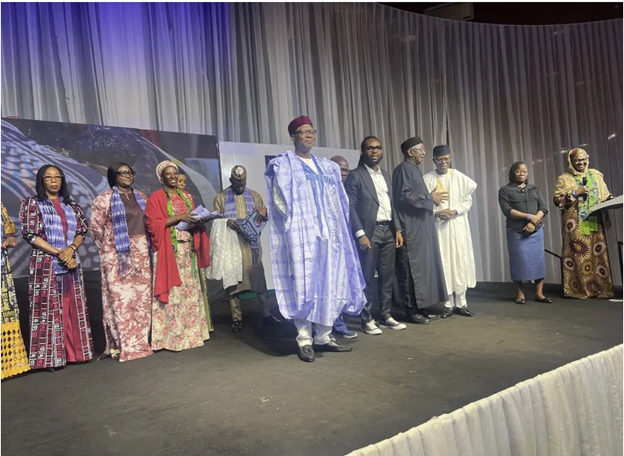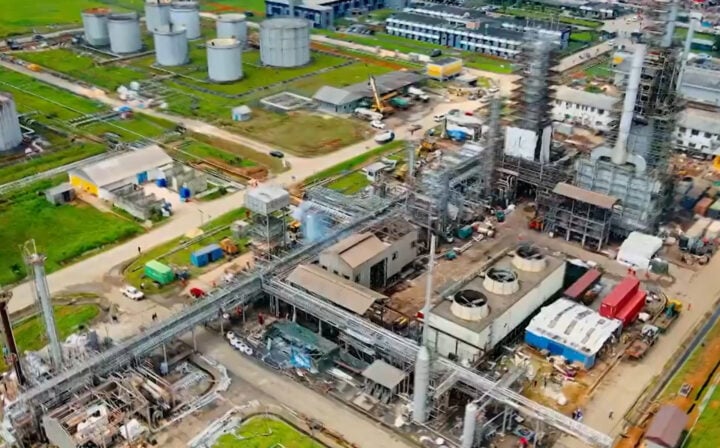BY AKINTUNDE BABATUNDE
A few weeks ago, I attended a major media sustainability conference organised by the Media Development Investment Fund and the Daily Trust Foundation. While the event focused on the future of journalism in Nigeria, it also served as the close-out event for NAMIP’s three-year work in the country.
There are so many good things one could say about NAMIP and its impact on Nigeria’s media sector. But what struck me most was a logo sitting quietly in the corner of all the media materials at the event — the MacArthur Foundation’s logo.
If you scan through all the major journalism innovations and interventions in Nigeria over the last 10 years, that logo is always there. And that is exactly what this article is about: nine years of aggressive media and journalism support in Nigeria.
Advertisement
Nine years after MacArthur launched its On Nigeria initiative, investigative journalism in the country stands stronger, more resilient, and better equipped to serve democracy. But new risks and funding questions remain.
In 2015, Nigeria’s journalism landscape stood at a crossroads. The country had long boasted a vibrant press tradition — fiercely independent newspapers, brave reporters, and a history of holding power to account. Yet beneath that surface, investigative journalism was fragile: scattered efforts, few dedicated investigative desks, limited funding, and reporters often working at great personal risk without institutional protection or legal support.
In a country where corruption, opacity, and abuse of power remained persistent threats to governance, something more systemic was needed — not just courageous individual journalists, but strong institutions capable of sustaining investigative reporting as a pillar of democratic accountability.
Advertisement
It was against this backdrop that the MacArthur Foundation launched its On Nigeria initiative — a bold, multi-year, multi-million dollar experiment to strengthen Nigeria’s accountability ecosystem, with investigative journalism at its core.
Nine years later, as MacArthur winds down this landmark intervention, its imprint on Nigerian journalism is both profound and instructive. This is the story of how a deliberate philanthropic bet reshaped the face of Nigerian investigative journalism — and the lessons it offers for other fragile democracies around the world.
THE MACARTHUR THESIS: JOURNALISM AS ACCOUNTABILITY INFRASTRUCTURE
Unlike many traditional development programmes, MacArthur’s approach was not simply to fund “projects” or sponsor isolated stories. The core thesis was more structural: build the capacity, institutions, and networks that allow investigative journalism to thrive sustainably, independently, and impactfully.
Advertisement
MacArthur recognised that investigative journalism is not simply about producing reports — it requires infrastructure: skilled journalists, ethical editorial leadership, legal protection, data access, financial stability, safety protocols, and above all, long-term resilience in the face of political and economic pressures.
The On Nigeria initiative thus positioned journalism not merely as media work, but as accountability infrastructure — a vital part of the public sphere, with ripple effects extending into policy debates, civic engagement, public sector reforms, and even electoral accountability.
WHAT MACARTHUR DID: INVESTING IN ECOSYSTEMS, NOT JUST ACTORS
What made MacArthur’s approach particularly transformative was the breadth of its interventions across multiple dimensions of the ecosystem.
Advertisement
(a) Strengthening newsrooms: At the heart of the initiative were direct investments into Nigeria’s leading investigative newsrooms. Premium Times Centre for Journalism Innovation and Development, TheCable, Daily Trust, International Centre for Investigative Reporting, Wole Soyinka Centre for Investigative Journalism, Sahara Reporters, and others received significant support — not just for story production, but to build institutional capacity: strengthen editorial independence, improve digital security, provide legal support, and expand civic technology innovation.
These investments allowed several outlets to establish dedicated investigative desks, attract and train young journalists, and build robust internal systems for fact-checking, verification, and accountability journalism.
Advertisement
(b) Civic media infrastructure: Beyond traditional newsrooms, MacArthur also seeded entirely new institutions that are now central players in the investigative journalism ecosystem. Platforms like DUBAWA (West Africa’s leading fact-checking outfit), Civic Media Lab, Dataphyte, HumAngle, and TheCable Index emerged as specialist institutions focused on evidence-based journalism, fact-checking, and data-driven reporting.
These organisations introduced new practices into Nigerian journalism — data visualisation, structured fact-checking methodologies, advanced digital research techniques — elevating both the quality and credibility of investigative work.
Advertisement
(c) Linking civic tech and accountability journalism: Recognising that data is the lifeblood of modern investigations, MacArthur extended support to civic tech organisations that democratise access to government data and empower citizens to track public sector performance. BudgIT, UDEME, Dataphyte’s Anfani, and Connected Development’s Follow The Money became key partners in connecting data activism with investigative storytelling.
By bridging civic tech and journalism, the On Nigeria initiative expanded the investigative toolkit, allowing reporters to move beyond whistleblower accounts to systematic monitoring of budget allocations, procurement records, public expenditures, and service delivery failures.
Advertisement
(d) Strengthening the education pipeline: Crucially, MacArthur recognised that sustaining investigative journalism requires nurturing new generations of journalists even before they enter newsrooms. The Foundation supported reforms in journalism curricula across several Nigerian universities, working with faculties to integrate investigative methods, ethics, fact-checking, and data literacy into teaching. This education pipeline is already producing young graduates equipped with stronger investigative instincts and sharper technical skills than previous generations.
By building university partnerships, supporting curriculum development, and organising faculty exchanges, MacArthur helped embed investigative journalism training as part of formal journalism education — creating a long-term talent pipeline to feed the broader accountability ecosystem.
(e) Collaborative networks and peer learning: Perhaps one of MacArthur’s most lasting contributions was its support for building horizontal networks across the sector. The creation of peer-learning networks such as the Collaborative Media Project led by the Wole Soyinka Centre and the NAMIP’s Nigeria Media Innovation Program, DUBAWA Factchecking fellowship, which allowed journalists, editors, civic activists, and legal experts to collaborate, share knowledge, and jointly tackle complex investigations.
This networked approach broke down the silos that often characterise Nigerian civil society work, enabling cross-institutional investigations, joint trainings, and mutual defense mechanisms when individual reporters or outlets came under attack.
THE RIPPLE EFFECTS: A TRANSFORMED ECOSYSTEM
The cumulative impact of these investments is now visible across Nigeria’s media and civic space. In nine years, a new generation of investigative journalists has emerged — trained, networked, digitally savvy, and deeply committed to public accountability.
Major investigations supported under this ecosystem have exposed procurement fraud in education health contracts, inflated defense budgets, diversion of education funds, and corruption in state-owned enterprises — some resulting in parliamentary hearings, ministerial resignations, criminal prosecutions, and policy reforms.
Beyond content, MacArthur’s investment also strengthened the defensive architecture around investigative journalism: legal aid systems for journalists facing lawsuits, improved safety protocols for reporters in hostile environments, and stronger institutional leadership to weather political pressures.
Today, Nigerian investigative journalism is no longer defined by few individual heroes. It is sustained by resilient institutions, protected by strong networks, and increasingly backed by a growing cohort of young professionals who see journalism as both a calling and a profession with standards.
WHAT MADE MACARTHUR’S MODEL IMPACTFUL?
The On Nigeria initiative offers valuable lessons for philanthropic practice in fragile democracies:
1. Long-term commitment: Change takes time. MacArthur’s multi-year funding model allowed grantees to plan, build, iterate, and grow — not merely survive year-to-year.
2. Flexible funding: Grantees were trusted to adapt their strategies as challenges evolved. This flexibility empowered innovation while remaining mission-focused.
3. Ecosystem mindset: Rather than funding isolated projects, MacArthur invested in the ecosystem: newsrooms, civic tech, universities, legal support, networks, and leadership development. Strong ecosystems survive shocks better than isolated actors.
4. Local ownership: MacArthur demonstrated a commitment to localisation by allowing Nigerian partners to define and adapt the initiative’s focus, fostering ownership, contextual relevance, and long-term sustainability.
5. Protection and resilience: Legal support, safety training, and organisational development helped insulate grantees from state harassment, financial vulnerabilities, and burnout.
THE UNFINISHED BUSINESS: NEW RISKS, OLD DILEMMAS
Yet even with these gains, serious challenges remain. Perhaps the most urgent is sustainability. Many of the institutions built with MacArthur support remain heavily dependent on donor funding, raising questions about long-term financial viability once external funding diminishes.
At the same time, Nigeria’s political environment has grown more hostile in recent years. Shrinking civic space, rising attacks on press freedom, new digital repression tools, and increasing legal harassment of journalists signal a toughening landscape for accountability work.
Furthermore, new technological threats — including misinformation, AI-generated deepfakes, and algorithmic manipulation — pose unprecedented challenges for investigative journalism globally, including Nigeria.
The sustainability dilemma also exposes a broader regional question: where is Africa’s indigenous philanthropic class? For all the foreign support, very few Nigerian or African corporate or high-net-worth individuals have stepped into the space of funding public interest journalism as a long-term civic responsibility.
LESSONS FOR GLOBAL PHILANTHROPY
For funders looking at fragile democracies elsewhere, MacArthur’s experience in Nigeria offers several takeaways:
● Don’t fund stories; fund institutions. Good journalism requires strong institutions.
● Build protection systems. Legal aid, safety protocols, and digital security must be part of any serious media support strategy.
● Invest in networks. Collaboration and peer learning strengthen collective resilience.
● Strengthen the education pipeline. Build university partnerships that embed investigative skills early.
● Let local leadership drive. External funders are most effective when they enable, not dictate.
● Be patient. Structural change takes years. Quick wins rarely endure.
THE NEXT CHAPTER
MacArthur’s big bet on Nigeria might have ended in Nigeria, but its footprint remains deeply embedded in the country’s accountability infrastructure. The seeds planted over nine years continue to bear fruit — not only in Nigeria but increasingly across West Africa, as platforms like DUBAWA, CJID, Dataphyte, BudgIT, HumAngle, and Civic Media Lab extend their models regionally.
However, sustaining these gains will require new champions — African funders, corporate sector leaders, universities, governments, and global partners who are willing to view investigative journalism as a public good deserving of long-term investment.
In a world increasingly plagued by shrinking donor funding, disinformation, state capture, and democratic backsliding, Nigeria’s experience under MacArthur’s On Nigeria initiative offers a hopeful example of what can happen when philanthropy takes a patient, strategic, and ecosystem-wide approach. The work is far from done, but the path has been charted.
Views expressed by contributors are strictly personal and not of TheCable.



